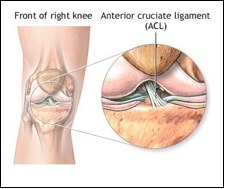The problem
- The ACL is the stabilising ligament of the knee, and acts to prevent buckling of the knee

- The mechanism of injury is usually from a pivoting action on a grounded foot, usually during sport
- Injury can be a partial tear or total rupture and management may change according to degree of tear
- When the ACL is completely torn, surgery is a possibility to reconstruct the ligament, but this is not always required. Your physiotherapist, GP, Sports Physician and/or an orthopaedic consultant may talk you through your options.
Interesting facts
- A ‘pop’ or ‘crack’ sound is often heard during injury
- Usually there is initial pain, although with a complete tear the pain can subside quickly (within minutes) but the knee often feels ‘unstable’, and may give way.
- Often ACL injuries can occur in combination with injuries to other structures such as the medial collateral ligament or medial meniscus
What you can expect/look out for
- Immediate swelling and bruising of the knee
- Feelings of instability or giving way
Hints for self management
- Initial injury management is as for most soft-tissue injuries;
- Rest and immobilise, use crutches to assist with walking
- Ice for 20 minutes every 2-3 hours for the first 3 days
- Compress the area to manage swelling, with a bandage or tight leggings
- Elevation, as able, lying on your back with leg elevated
- Seek diagnosis by seeing your GP or visiting one of the experts at Sydney Physiotherapy Solutions, and the decision to confirm with imaging such as MRI may be made at that time
Management options
- ACL tears may require review by an Orthopaedic Surgeon
- The surgeon will discuss with you both conservative and surgical options
- With a partial tear or in an individual who does not play high-level sports, it may be decided to manage the knee non-surgically with physiotherapy and exercises – you will want to seek an expert knee physio to guide you through this process
- A full tear may be managed with a surgical reconstruction, using a patellar tendon or hamstring graft.
- Surgery is not always required
More information
- A knee reconstruction will mean time away from sport and significant rehabilitation
- Return to sport in most cases is after 9 months rehabilitation
At Sydney Physiotherapy Solutions our highly qualified physiotherapists specialise in the assessment, treatment and prevention of neuromusculoskeletal injuries.
Contact us today – 9252 5770

